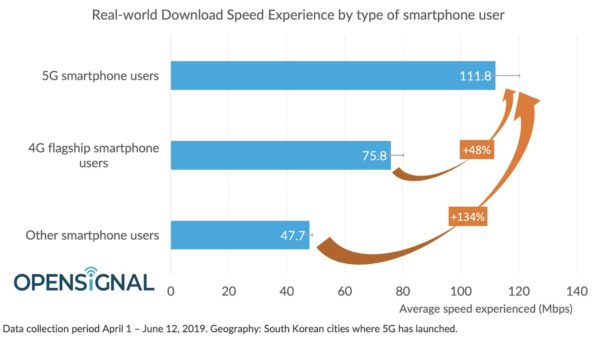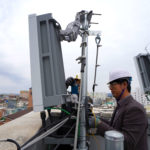The first 5G networks launched so far in South Korea are giving users faster download speeds in real-world tests, with the experience expected to improve further as the technology matures, according to a study by Opensignal.
The mobile analytics firm found that users got an average of 111.8Mbps when connecting their 5G phones to the new networks rolled out earlier this year.
While that number may not seem fast, it is still 48 per cent zippier than users with comparable 4G flagship phones and 134 per cent higher than users of other 4G phones. In comparison, Singapore’s average download speeds now are only at 39.3Mbps.

The study was done from April 1 to June 12 at South Korean cities where 5G was available, according to Opensignal, which released the results today. The country already has one million 5G users now.
It is the largest deployment yet of the new cellphone technology, with the largest cities all hooked up to it. In the United States, only two cities now offer 5G.
The good news is Opensignal, which tracks users’ actual usage, has shown that 5G can reach top speeds of around 1Gbps in both countries, as the technology has promised.
What’s not so cool is that the current rollouts of 5G networks are only using the new link for speedy downloads. Other network functions, like uploads, are still relying on old 4G links.
Users also don’t enjoy the big game changer on a 5G network – much lower latency, or nearly no lag in the connection. For now, they are unable to access new applications such as remotely controlling machinery or having autonomous cars linking up with one another.
Addressing this, Singapore’s government regulator has called for what is known as a “standalone” 5G network, which does not rely on 4G equipment for its core network functions.
On Tuesday, the Infocomm Media Development Authority chief executive officer, Tan Kiat How, reiterated that the country needs 5G to do more than just boost download speeds.
It has to be a “public utility” that brings innovative new applications and services to Singapore, he said, at the opening of this week’s ConnecTechAsia industry event.
At least for now, the mood among many telecom operators seems bullish. They expect 5G to usher in a new era of smart connected devices, from weather sensors to autonomous vehicles, that can respond much more quickly. The improvements will go beyond speed boosts.
“As vendors fix 5G teething issues and refine their solutions, peak and average 5G speeds will improve,” said Opensignal’s vice-president for analysis, Ian Fogg, in a report today.
“We expect the experience of 5G users to change during the course of 2019, as 5G’s coverage improves and vendors resolve initial 5G problems,” he added.






